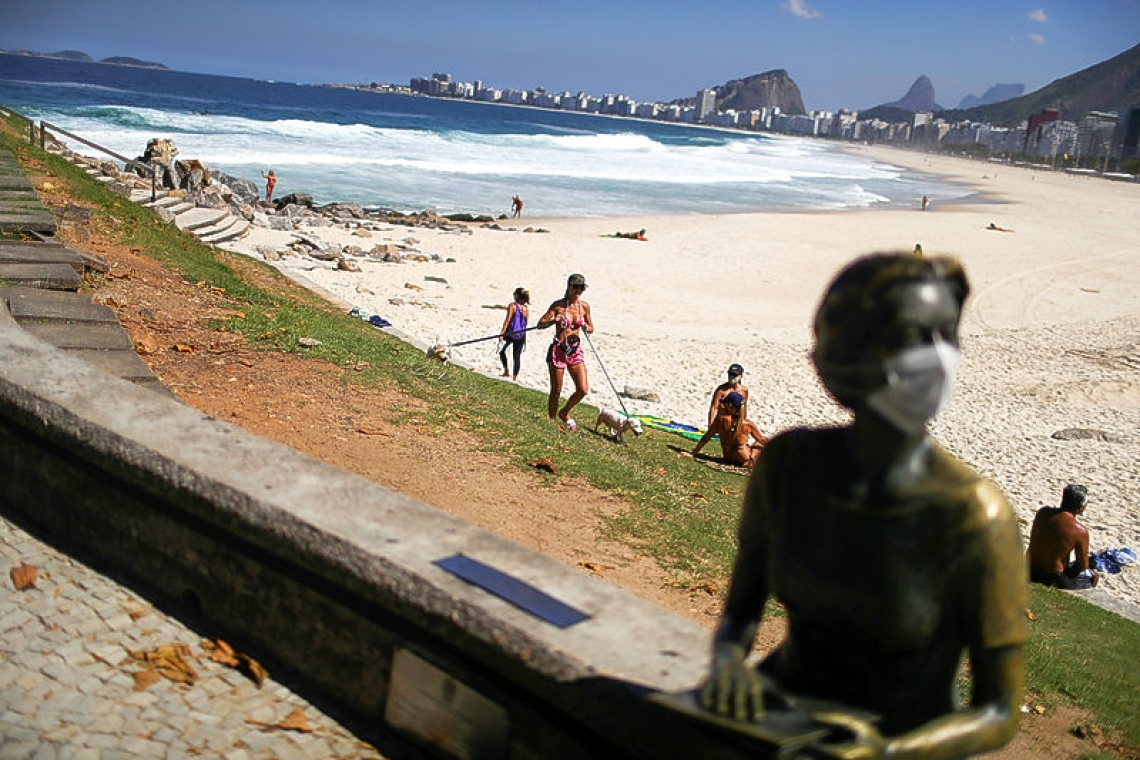RIO DE JANEIRO/SANTIAGO--Last week, a mall in southern Brazil laid out a red carpet and welcomed back a stream of masked customers after the state loosened coronavirus lockdowns for commercial businesses. A saxophone player serenaded clients as they filed in.
The images of the newly packed Neumarkt Shopping mall in the city of Blumenau reverberated across Brazil. Some people applauded the decision and others criticized a potentially lethal move just as the outbreak was gathering steam. One Twitter user even added a tongue-in-cheek soundtrack to the video: music from the movie "Titanic".
The incident revealed a fragile fault line across Latin America over how and when to re-open the region's largely shuttered economies - despite the fact that the worst of the outbreak has yet to hit countries including Brazil and Mexico.
The increasingly acrimonious debate comes as data collected by Reuters showed coronavirus cases in Latin America accelerating much faster than in other parts of the world. The region surpassed a grim milestone on Wednesday: 10,000 deaths and 200,000 confirmed coronavirus cases.
On April 22, the day of the mall's reopening, Blumenau had 98 confirmed coronavirus cases, according to city hall data. Just four days later, the tally had jumped more than 70% to 167 cases.
"The reopening of the mall was a very bad act, at a very bad time, done in the wrong way," Blumenau's Mayor Mario Hildebrandt told Reuters. The mall operator, Almeida Junior, said it followed all state regulations.
Hildebrandt said the jump in cases could not be directly linked to the mall opening. Instead, he attributed it to an earlier decree relaxing commercial shutdowns, and ramped up testing. Nonetheless, he said reopenings must prioritize lives.
Brazilian President Jair Bolsonaro, the highest-profile member of the back-to-business brigade, has taken a different tack. A longtime critic of stay-at-home measures, the far-right former army captain says the economic cost outweighs the dangers of what he has called a "little flu." He has advocated isolating older people and letting younger people work.
"I'm sorry, some people will die, they will die, that's life," he said last month. "You can't stop a car factory because of traffic deaths."
On Wednesday, the day after Brazil's official death toll passed China's, the health ministry reported a total of 5,466 deaths, and 78,162 confirmed cases. The steady increases have sparked fears that Latin America's biggest economy could soon become the world's newest coronavirus hotspot.
"So what?" Bolsonaro told reporters when asked about the deaths on Tuesday. "I'm sorry, but what do you want me to do?"
Although public approval of Bolsonaro's handling of the crisis has waned, support for lockdowns is also slipping. Just 52% of Brazilians back broad lockdown measures, down from 60% at the start of April, a poll published by Datafolha on Wednesday showed.
For those itching to return, the Blumenau case may serve as a cautionary tale. "The vast majority of those infected are aged between 20 and 59, or in other words, those who are economically active," Mayor Hildebrandt said, referring to those who recently fell ill. "That means that whoever went back to work ... has a higher chance of infection."
The debate in Brazil is playing out across Latin America, most of which is facing its steepest recession since the 1930s. Mexico has 17,799 confirmed cases, which authorities admit is a fraction of the true total. The peak of infections is expected in the first half of May, and the strain is already beginning to show in Mexico City, with some private hospitals out of space.
Despite concerns about rising infections, the government is facing calls to loosen restrictions on industry. More than 300 U.S. CEOs wrote to President Andres Manuel Lopez Obrador last week lobbying for a fast reopening of their suppliers in Mexico.
With North American economies tightly integrated, an extended shutdown in Mexico would crimp the ability of U.S. factories to reopen. Mexico is drawing up a calendar to permit automakers and their suppliers to return to work in time for the reopening of the U.S. auto industry, which may come after May 4.
Lopez Obrador, who like Bolsonaro has been widely criticized for playing down the coronavirus, has signaled that any opening could be gradual and will take into consideration health risks. "We are going to look for the best moment, it is a matter of achieving the balance between health and economics," he said on Monday.
In contrast with Brazil and Mexico, Chile has won praise for its mass testing regime, limited pressure on hospitals and low death toll. By Wednesday, Chile had 14,365 confirmed cases, and just 207 deaths, government data showed.
Last week, President Sebastian Pinera said he would begin gradually defrosting the economy. The government has started recalling civil servants, announced the end of school closures and gave tacit backing to the reopening of smaller malls.
Yet the government's plans have also faced criticism - not least from major mall operators. Last week, Horst Paulmann, CEO of Chile's biggest mall operator, Cencosud, said reopening malls would be "a grave mistake."
"Malls are like cities, with 200 stores or more than anyone can control," he told a Chilean newspaper.
At a recently reopened mall in the Santiago suburb of Patronato, clothes shop owner Miriam Dababneh, 51, was relieved to be back at work. "This (outbreak) was a very hard blow," she said through her mask. "This is not a sign of normality, just a measure to stopping us going bankrupt. For us to open is to breathe again."







